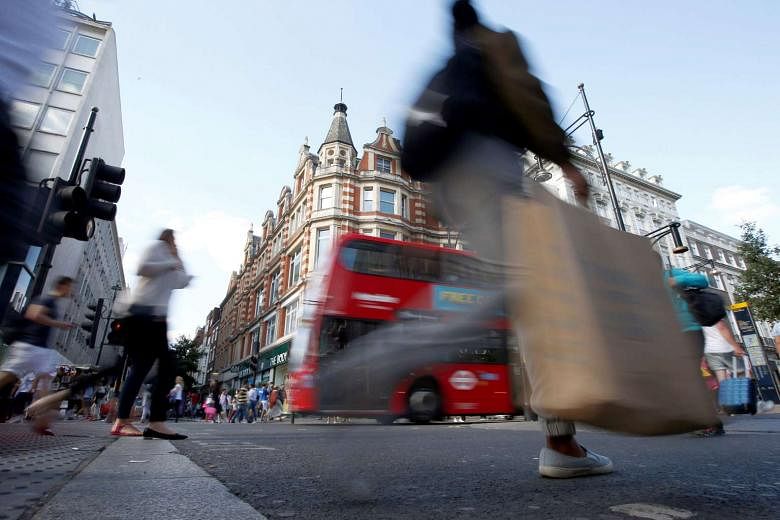LONDON • Britain's high streets are heaving with shoppers despite June's shock vote to leave the European Union, big companies reported few signs of distress and some tabloid papers are talking about a post-Brexit economic boom.
The overwhelming view from economists is that it is too early to know how Britain will cope with years of Brexit uncertainty - but there is a growing belief the country can avoid a recession that only weeks ago was regarded as likely.
On the face of it, the early optimism contrasts with the pre-referendum warning from former Prime Minister David Cameron that a Brexit vote would put a "bomb under the economy".
August's retail sales reversed much of an immediate post-Brexit vote fall, with retailers reporting their strongest sales in six months, industry data showed on Thursday, partly due to a weaker pound attracting overseas buyers.
Official figures out last week showed the number of people claiming unemployment benefit fell unexpectedly last month.
Data from the Office for National Statistics released yesterday showed that gross domestic product rose by 0.6 per cent in the second quarter and was up by 2.2 per cent, compared with the same period last year.
Before the June 23 referendum, the British finance ministry had warned a Brexit vote would mean homeowners facing higher borrowing costs, pushing the economy into a "DIY recession", and that equity prices were likely to fall.
However, nearly half of mortgage borrowers look set to gain from the Bank of England's interest rate cut on Aug 4, while British equity markets have risen.
Some British newspapers which supported the Leave campaign have hailed such news. "Remainers were WRONG!", declared the Daily Express earlier this month, adding: "Brexit Britain booms".
But most economists do not share this jubilation and caution that these positive signals may have little bearing on the long-term outlook for the economy, which must contend with years of uncertainty as Britain extricates itself from the EU.
New British Prime Minister Theresa May has said she will not trigger the EU's Article 50 this year to begin formal talks with the bloc to negotiate the terms of Britain's exit from the EU and its future trading relationship with the bloc.
Berenberg Bank's chief economist Holger Schmieding said "the fact that the UK avoided an immediate crisis does not tell us much about the future", adding that he thought Britain would probably avoid a technical recession - defined as two consecutive quarters of falling economic output.
Former Bank of England interest-rate setter Charles Goodhart said that so far, there had been almost no data on important areas of the economy such as investment, inventory levels and construction. "I think it would be very dangerous to take a position either that it's all going to be all right and that the fears were massively overdone, or that the fears were justified," the professor at the London School of Economics said."The answer is, frankly: we don't know."
REUTERS

